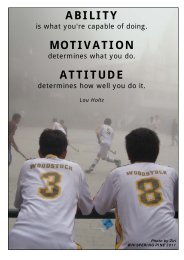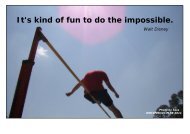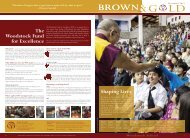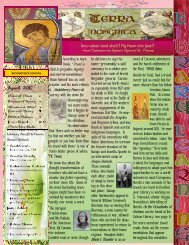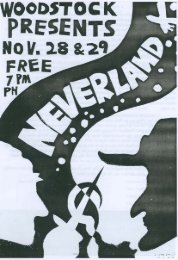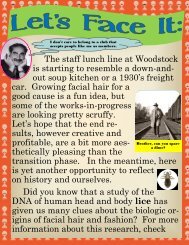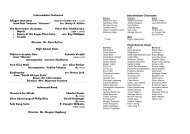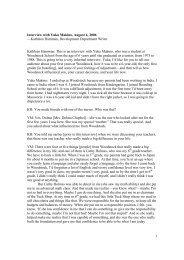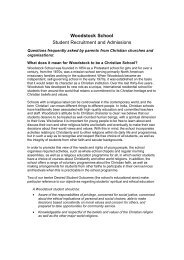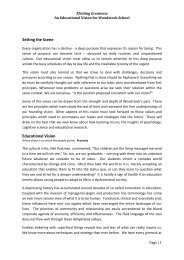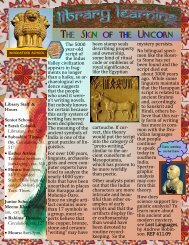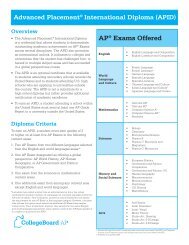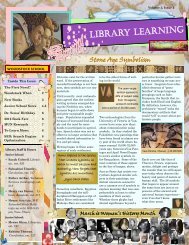Woodstock School Alumni Magazine Vol CIV, 2011
Woodstock School Alumni Magazine Vol CIV, 2011
Woodstock School Alumni Magazine Vol CIV, 2011
Create successful ePaper yourself
Turn your PDF publications into a flip-book with our unique Google optimized e-Paper software.
Quadrangle - 15<br />
Read two testimonials from weary but lifechanged<br />
young people just arrived back<br />
from the inaugural <strong>Woodstock</strong> Gap Semester.<br />
Chaperone, coordinator and translator Necha<br />
Varma, an experienced trekker, accompanied<br />
the travelers through all the activities. Meet<br />
Sarajane Clark from Washington and Varun<br />
Sarin from Virginia.<br />
How did you hear about the Gap<br />
Semester?<br />
SARAJANE: I graduated from High <strong>School</strong><br />
last year and my grand-dad Bob Harwood ’43,<br />
an alumnus, suggested it. I was open to having<br />
a gap year in a Himalayan environment<br />
VARUN: My father and Krishnan Kutty, head<br />
of Outdoor Education at <strong>Woodstock</strong>, shared a<br />
mutual friend who suggested the Gap Semester.<br />
I had just finished my sophomore year and<br />
wanted to take a break.<br />
When did you arrive?<br />
SARAJANE: We flew into India on August<br />
7, to begin on August 11. The timetable tries<br />
to allow 10–14 days for each activity.<br />
Where did you begin?<br />
VARUN: We began at the Landour Language<br />
<strong>School</strong> for a two-week conversational Hindi<br />
course, which gave us the basics to be able to<br />
ask for things, thank people and ask questions.<br />
It was hard but fun.<br />
SARAJANE: After that we went to the Hanifl<br />
Centre here at <strong>Woodstock</strong> for a two-week<br />
Intensive First Aid Course called Wilderness<br />
First Responder. This was so much fun and<br />
focused on rescue and dramatization of events<br />
that may happen while we are hiking and scaling<br />
mountains.<br />
And after that?<br />
SARAJANE: We then began our trek into<br />
the Rupin valley and attempted to cross the<br />
Rupin pass. However, very heavy rains and<br />
raging rivers prevented us from getting to the<br />
pass. We had to turn back just one day before<br />
the crossing. On the return, we trekked long<br />
hours and stayed in the jungle for a night before<br />
getting to a roadhead. This was a ten-day<br />
trek and was awesome.<br />
VARUN: Then it was on to a home-stay in<br />
a village called Demul, close to Kaza in the<br />
Lahul-Spiti District of Himachal Pradesh,<br />
where we helped build a greenhouse for the<br />
village people to use in winter to enable them<br />
to grow green vegetables. Demul sits at an<br />
altitude of 14,300 ft. The greenhouse was<br />
made of mud and local materials. The food<br />
at the home-stays was great and we felt very<br />
comfortable.<br />
The next stage of their journey brought them<br />
back to Mussoorie to participate in the 3rd<br />
Mussoorie International Writer’s Festival with<br />
the theme of “Mountain Literature”. They got<br />
an opportunity to interact with luminaries like<br />
Dr. George Schaller, Harish Kapadia, Jim<br />
Curran, Bernadette McDonald and others.<br />
After the Writer’s Festival, the group went<br />
to the Nehru Institute of Mountaineering,<br />
Uttarkashi, for a 16-day session to learn<br />
basic camping, trekking, rock climbing and<br />
mountaineering skills. The culmination of the<br />
training was an attempt to climb a peak called<br />
Draupadi-ka-Danda II (18,600 ft). They had<br />
to turn back about 300 ft below the summit<br />
because of hip-deep snow and worsening<br />
weather conditions.<br />
Next they left for the Kumaon region of Uttarakhand.<br />
They stayed with CHIRAG for<br />
ten days. Their time with this NGO was spent<br />
with an exposure to women’s self-help groups,<br />
children’s education, organic farming and village<br />
forestry issues. This was followed by ten<br />
days in the periphery of the Corbett National<br />
Park. The focus here was on human-animal<br />
conflict as it relates to wildlife tourism, the<br />
politics of eco-tourism, wildlife viewing, birding<br />
and angling.<br />
What did you get out of your Gap<br />
Semester?<br />
VARUN: I discovered myself. I am more<br />
independent than I thought I could be. I also<br />
learnt that I could be on my own and enjoy<br />
it. I came with no expectations and an open<br />
mind, I am proud of myself , I have grown and<br />
gotten stronger. I will have a month off and<br />
go back to my Psychology major. I will look<br />
at it differently now, because of the changes<br />
in me. I am so glad I did this. It challenges<br />
you not only physically but mentally as well.<br />
Sometimes during the semester I felt I was<br />
not part of the real world, or any world, due<br />
to the remoteness. It exposes you to cultures,<br />
but so do many things. This is really something<br />
so different. The trek was the hardest thing I<br />
have ever done both physically and mentally.<br />
SARAJANE: I thought I was used to pain<br />
through the physical challenge of all the sports<br />
I play, but with the mental challenge as well, it<br />
was such an achievement. I guess I learned I<br />
do not want to be a mountaineer! I got to know<br />
myself too. I understand my own personality<br />
through these challenges. Why would you not<br />
want to experience this?<br />
Sarajane returns to casual work for six<br />
months before going to college in the fall of<br />
next year. She has a choice of Washington,<br />
California and Montana. “I am still thinking<br />
through my decision. I look at things<br />
differently now.”



